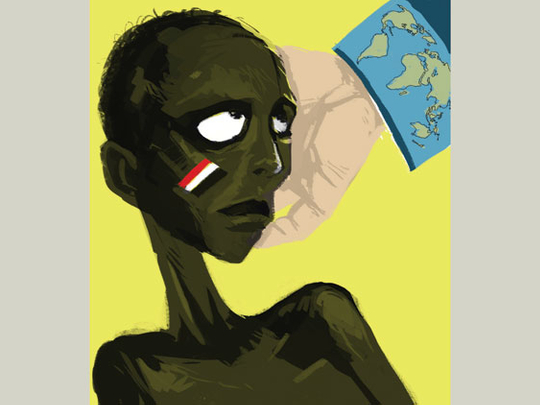
Yemen is in crisis. By now, we have all heard of the catastrophic food crisis or seen pictures of starved, malnourished children and the elderly in newspapers and television. Nearly half the population, 10 million people, is going hungry right next door, while around 300,000 children are severely malnourished.
The humanitarian crisis in Yemen has prompted a quick response from the UAE. The Red Crescent Authority campaign, Sanadhom, launched on June 29, has so far collected Dh18.6 million to provide immediate humanitarian support for Yemen.
Yes, the Sanadhom campaign is a noble response from the UAE leadership and community to attend to Yemen’s urgent needs. While relief aid seems the right thing to do, and most certainly will save many lives, we must remember that food is not always enough. Emergency supplies, shelter, health care, clean water are all essential.
But what next?
People in Yemen are not malnourished because of a lack of food, but because they cant afford to buy the food that is already available.
Yemen’s humanitarian crisis comes as no surprise. The dire situation is a result of chronic underdevelopment, exacerbated by years of conflict and slow growth. Last year’s Arab spring, which rid Yemen from former president Ali Abdullah Saleh after 33 years in power, still echoes of ensuing political, social and economic troubles.
The revolts have increased the pressure on an already volatile environment, characterised by economic stagnation, dwindling oil reserves and falling oil revenues, acute water shortage and a growing population — where more than two-thirds are under 24 and a third are jobless. Yemen is the poorest country in the Middle East with 40 per cent of Yemenis living on less than $2 (Dh7.35) a day and 50 per cent are illiterate (according to Unicef data). Children make up nearly half of Yemen’s population, and are already facing many challenges, including low birth registration rate, low school enrolment rate and early marriage.
All combined, you have a nation battling a catastrophic humanitarian crisis.
Tackling malnutrition and poverty does not mean we send powdered milk, sacks of rice and date bars. What many fail to realise is that even if the crisis is contained, Yemen will have a generation growing up with cognitive impairment due to malnutrition.
Yemeni children need to go back to school and be healthy. Their parents want to get back to work and put food on the table. They want to be able to afford medicine and clothing.
Emergency aid responds to emergencies. It does not solve it and it will most definitely not prevent it. It is only a short-term solution. Chronic challenges like hunger, poverty and unemployment are much more complicated to address.
Providing food and related assistance to alleviate hunger, if not done effectively, can also have a detrimental effect on the economy. In-kind food aid, for example, if not purchased locally, can cause market imbalances and undercut local farmers. That is why, it was an effective measure when a grant of Dh500 million was made by President His Highness Shaikh Khalifa Bin Zayed Al Nahyan to purchase food items from the local market and urgently distribute them to Yemeni people.
Emergency aid is not a panacea. It is integral that emergency responses first cater to recovery and then they ought to focus on long-term development.
In January 2010, led by the United Kingdom and Saudi Arabia, the Friends for Yemen forum was set up and the group pledged $4 billion to help fight terrorism and develop its economy.
Development and security are two sides of the same coin. The Yemeni Planning Minister, Mohammad Al Sa’adi stated last May: “Investment projects, important as they are, can be postponed, but not humanitarian aid.” The international community needs to devote as much attention and resources to Yemen’s development challenges as possible because unless development is addressed simultaneously, security will fall apart.
For our neighbour to thrive and pull its people out of their plight, emergency response requires space for recovery, reconstruction and development. Immediate help must not nullify the need for long-term commitment. Yemen is still a very fragile state. The country still faces extraordinary challenges. Without our long-term commitment and support, Yemen is dangerously ripe for anarchy.
Asma Malik is a development specialist. You can follow her on Twitter at www.twitter.com/AsmaIMalik










